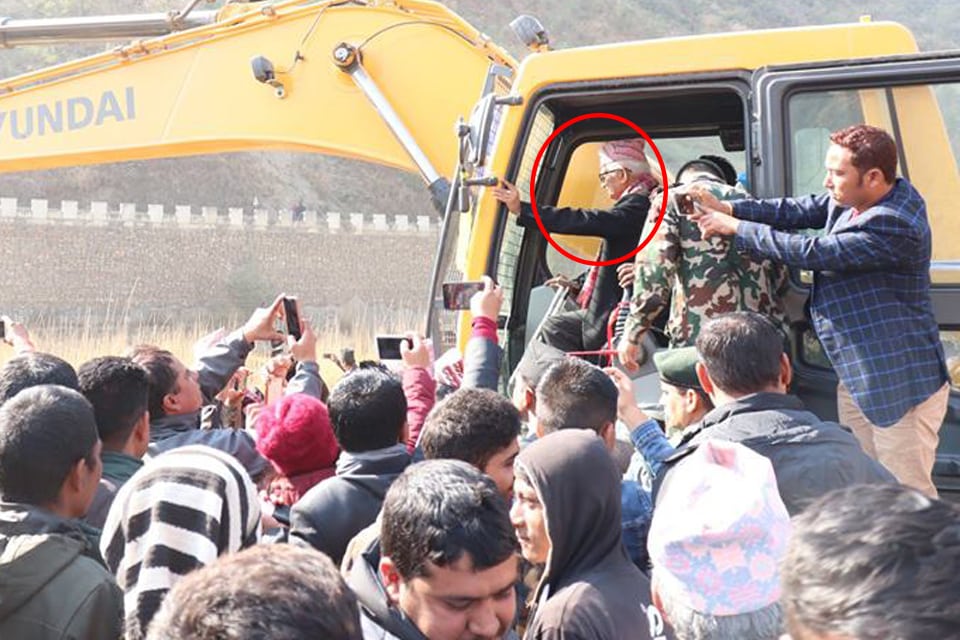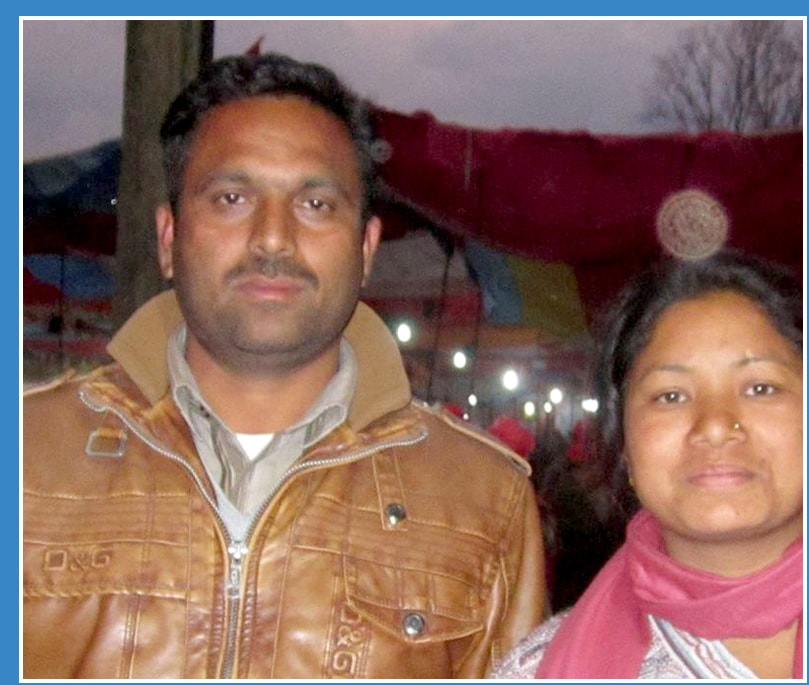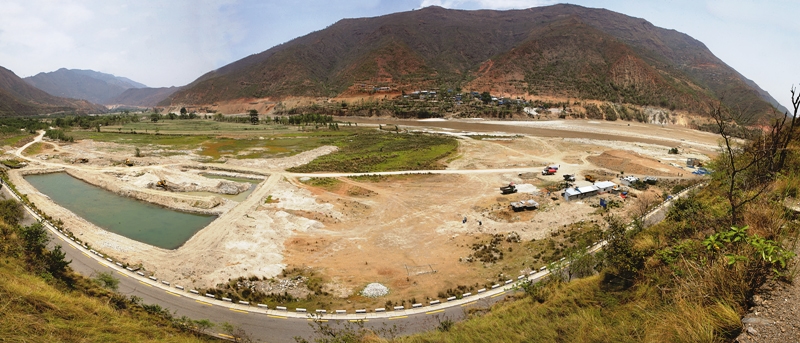In what can be described as a blatant encroachment of public land, a total of 511 ropani of such land on the margins of Sunkoshi river in Sindhuli district have been converted into fishery farming and that too at the initiation of the Chief Minister of Province 3, Dor Mani Poudel.
Ramu Sapkota and Bikram Rai: Centre for Investigative Journalism-Nepal
Inaugurating the fishery project at the banks of Sunkoshi River on January 7, 2019, Chief Minister Poudel had made an announcement saying, “We have not been able to implement our promise of transforming the traditional system of agricultural farming to scientific and techno-friendly farming.”

Chief Minister of Province 3, Dor Mani Poudel inaugurating fishery farming located in banks of Sunkoshi, Sindhuli on 7th Jan 2019 by operating excavator. Photo courtesy: Sunkoshi rural municipality Facebook page
He had then said all in conceited tone that the Sindhuli district had taken a lead in transforming the farming system by taking the initiatives such as the fishery farming project.
“The provincial government is always there to support an income and employment generating projects for the people,” he assured the locals of the district while inaugurating the project.
Now that the project boasts of having three fishery ponds already even though the plan is afoot to dig a total of 35 ponds altogether at Kamerefaat in Sunkoshi rural municipality-2.
Unfortunately, a total of 511 ropanis of government (public) land have been encroached upon in the name of digging the fishery ponds.
Earlier in 1985-86, the Sunkoshi River used to flow from the place where the ponds are currently being dug. After the river changed its course, people used the land for cattle grazing, washing clothes, and even performing funeral rites.
The public land at the banks of Sunkoshi River has been encroached upon at the behest of the local government to make fishery ponds. The federal government in its programs and policies has announced that it would return all lands that have been encroached upon within the next one year after investigating the cases of irregularities.
However, the land at the banks of the Sunkoshi River got encroached upon with the elected representatives of people being complicit in it. Deepa Dahal is the chairperson of the village municipality now. The work of fishery farming is moving ahead with the help extended by local multipurpose finance cooperatives. Dahal says the land has been given on lease to the cooperatives for 25 years at the rate of Rs 300,000 per month. “Three ponds have been completed by using excavators. The excavation of rest of the ponds will be done soon,” she assured.
According to assistant secretary at the Ministry of Federal Affairs and General Administration, Jivlal Bhusal, leasing public land is against the law since the Local Government Operation Act 2074 does not have such provisions. “Leasing out public land at the river banks is abuse of authority and amounts to resorting to anarchy,” he said.
Government’s investment in cooperatives
Interestingly, the Land Reforms Management, Agriculture and Cooperatives Ministry of Province 3 is the chief investor of the fishery pond. It has invested a total of Rs 8.5 million for the same. Likewise, the village municipality has invested Rs 3.8 million.

Rajan Dahal and Deepa Dahal
However, no one has the answer as to why they made this investment. Spokesperson of the Ministry of Land Reforms Management, Agriculture and Cooperatives Ministry of Province 3, Nirmal Gadal claims that the public land at the banks of Sunkoshi River has been leased out as per the provincial government’s policy to ensure that all lands are used for cultivation and not be left barren.
The plan is to expand the project to 700 ropanis of land from the initial 511 ropanis, which is purported to go against the existing law. The brain behind the project is the chief of the Sunkoshi village municipality Dahal and her husband Rajan Dahal, who is also the member of the State 3 province assembly. Interestingly, Chief Minister Dor Mani Poudel, and Land Management, Agriculture and Cooperatives Minister Dawa Dorje Lama are also involved in the project.
Initially, village municipality chief Dahal had presented the project proposal at the Ministry of Land Management, Agriculture and Cooperatives. “The project work kick-started after they consented to my proposal,” she admitted.
Aides close to Dahal couple and Nepal Communist Party (NCP) local cadres have dominated the cooperatives. Rama Dahal, the treasurer of the cooperatives, is a relative of village chief Dahal, and Upendra Koirala is the NCP local worker. Secretary of the cooperatives, Rajan Rayamajhi, is also the former member of the then CPN-UML-affiliated Youth Association of Sindhuli district. Most of the shareholders are Dahal’s relatives.
Kapil Koirala, the Nepali Congress candidate in the local level election alleged the village chief Dahal for encouraging the NCP workers to encroach the public land at the Sunkoshi banks in the name of the cooperatives.
“We conducted a signature campaign and then submitted a memorandum to village chief Dahal protesting the encroachment of public land. She, however, said she was not in a position to do anything,” Koirala said adding, “We along with two former parliamentarians apprised the Chief District Officer of the issue and wanted him to stop the encroachment of public land but in vain. The CDO too responded the same way expressing helplessness.”

A pond dug for fishery farming near banks of Sunkoshi Photo: Bikram Rai
Meanwhile, a meeting of around 84 locals on April 26 urged the concerned authorities to stop the excavation of public land in the name of fishery project, which too went in vain.
After the concerned authorities ignored their voices, the locals are preparing to move the court.
The Sunkoshi River, which has already lost its charm due to the rampant operation of crusher industries, has become more vulnerable and unsecured due to the fishery project. The cooperatives and the village municipality jointly sold the sand, gravels and pebbles (which were excavated for running the fishery projects) to four crusher industries operating at Kamerefaat.
According to Krishna Prasad Sapkota, former chairperson of Federation of District Development Committee, neither the federal government nor the local government can lease public lands as per laws. “The local government should not go against existing legal provisions,” he said adding, “If this continues, chances of federal government’s intervention remains high, which will be unfortunate for the local government in the long run.”



